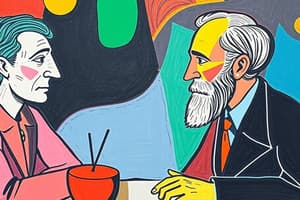Podcast
Questions and Answers
What was the title of the first textbook on psychology written by Wilhelm Wundt?
What was the title of the first textbook on psychology written by Wilhelm Wundt?
- Principles of Physiological Psychology (correct)
- The Psychology of Human Experience
- Exploring Consciousness and Cognition
- Understanding the Mind: A Comprehensive Guide
In what year did Wilhelm Wundt establish the first laboratory dedicated to psychology?
In what year did Wilhelm Wundt establish the first laboratory dedicated to psychology?
- 1887
- 1895
- 1879 (correct)
- 1865
Which method did Wilhelm Wundt use to break down complex mental phenomena into simpler components?
Which method did Wilhelm Wundt use to break down complex mental phenomena into simpler components?
- Functional Magnetic Resonance Imaging
- Introspection (correct)
- Cognitive Biases Analysis
- Behavioral Observations
What aspect of human thought and behavior did Wilhelm Wundt aim to investigate through his approach?
What aspect of human thought and behavior did Wilhelm Wundt aim to investigate through his approach?
What did critics of Wilhelm Wundt's method of introspection argue?
What did critics of Wilhelm Wundt's method of introspection argue?
Flashcards are hidden until you start studying
Study Notes
Wilhelm Wundt: The Father of Experimental Psychology
Wilhelm Maximilian Wundt (1832–1920) is recognized as the founder of experimental psychology and the first to establish a psychology laboratory. As a German physiologist and psychologist, he played a pivotal role in developing psychology as an independent scientific discipline and introduced innovative approaches to understanding the workings of the mind.
Wundt was born on August 16, 1832, in Neckarau, near Mannheim, Baden (Germany). He earned his medical degree at the University of Heidelberg in 1856. Following his studies, he worked under renowned scientists like Johannes Müller and Hermann von Helmholtz, whom he learned from while working as an assistant physiologist at Heidelberg University. During this period, he began writing his early works, such as the influential "Contributions to the Theory of Sense Perception".
Founder of Experimental Psychology
Wundt is best known for his pioneering role in establishing experimental psychology as a distinct scientific discipline. He showcased the potential of psychological research through rigorous experiments and methodologies borrowed from natural sciences, thereby breaking away from philosophy-based approaches to psychology. His groundbreaking work contributed to the recognition of psychology as a separate field of study.
Contributions to Psychology
Textbooks and Books
Wundt wrote the first textbook on psychology, titled "Principles of Physiological Psychology," which was the foundation for his teachings on experimental psychology. This book introduced his ideas about studying consciousness through introspection and delved deeper into sensation, perception, feelings, volitions, and apperception - the conscious formulation of experiences.
Establishment of Laboratories
In 1879, Wundt established the first laboratory dedicated to psychology at Leipzig University. This marked a turning point in the history of psychology, setting a precedent for subsequent laboratories worldwide. The lab facilitated research on various topics related to psychology and became instrumental in shaping the discipline's future direction.
Introspection and Structuralism
Understanding the structure of mental processes was central to Wundt's work. He employed a technique called introspection, which involves conscious reflection on internal mental states like thoughts, images, and feelings, to analyze and break down complex mental phenomena into simpler components. Through this approach, he aimed to reveal the basic building blocks of human thought and investigate how they interact.
Although his method of introspection was influential in the early days of psychology, it eventually fell out of favor. Critics argue that introspection is subjective and cannot be objectively verified, as observable behavior alone can be quantified and tested. Despite this controversy, Wundt's emphasis on objective experimentation laid the groundwork for the modern scientific approach to psychology, which continues to dominate the field today.
Overall, Wilhelm Wundt's contributions to psychology include his seminal textbook, the establishment of the world's first psychology laboratory, and his innovative application of scientific methods to understand the intricacies of human thought and behavior. His legacy has significantly influenced the development of psychology as a discipline and continues to shape our understanding of the mind and its functions.
Studying That Suits You
Use AI to generate personalized quizzes and flashcards to suit your learning preferences.




